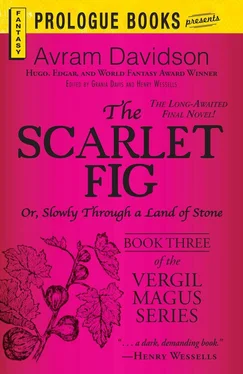“Here is a half a gold paleologue for thee. I made it —,” he said, with a look of sudden cunning upon his face which would not have long deceived the idiot boy who sloped about the streets and with a scoop dog-pure for the tanners; “myself. But have chosen to cast it in a mold, so. It does not pay to leave unminted gold around. Did he ever … project? ”
“Oh, thank you, master! Well … master …”
Ah, the elaborations of Naples! There were those so dim and mirk that the invention of a new lamp would perhaps have been of more service than that of a new metal, cellars like crypts, not cleaned since the lustrations of the year that Junius Plato was emperor, lit chiefly by the glow of the small furnace; large and bright and airy rooms with fresh plaister fresh painted a creamy yellow, so different from the others where the gypsum fell off in flakes all grimed from the dirt of all the long dirty years … elaboratories whose masters were indeed haggard and gant with feverish eyes sunken from sickening hopes, still intent every minute with expectation that this time the pot would indeed be pregnant with a glory like a new-coined sun … elaboratories where the master briskly worked on stinking caustics designed to wash wool clean so as to weave well: — actually places where pentangles were enscribed on floors rough-swept for the purpose … and little enough that did to the purpose … the purpose being to project , an intention much the same as to transmute , the step just before the step transmuted … masters of an age to be still hearty and hail and in good thrift, but swaying and sick from the inhalations of the sophic sulphur and the sophic mercury intended to liberate gold from (as they thought) the frowsy atoms which concealed it …
“And you, madam,” he said, without preamble, “how did you know that I would be coming, that you called me by name? Names?”
“Oh,” she said, “Huldah told me.”
He thought she had not understood, and disdained to press the matter. But it was not she who had misunderstood. Therefore changed he the subject; “Keep you always the estuary of your river veiled, and indeed all your coast?”
“By no means. Only against those undesired. Sometimes even from Babylone people come,” what a great ellision! were none desired from less far away than Babylone? “— come, have come, and some came lately. And we trade. The speech of Babylone is near to the Punic speech in substance and in essence; have you seen how they keep records?” She took down a few small wooden boxes from a shelf and opened them, one by one. In each was something wrapped in scarlet tow, a slab of sun-baked mud with very odd markings incised upon them. He had seen such things before, but he did not tell her so. At least not directly. “This one is from Charyx Spasini,” she said, scanning the tag.
“… ‘of the long water walls?”
“That very same. And this is from Dura-Europos … or is it Duros-Europa?”
“Let us look and see.”
“Oh no. They don’t use the Latin or Greek names, though they must all know them; for that matter, really, they all know Latin or Greek. Latin and Greek. But there you are — clerks! clerks! — always maintaining their mysteries; o pópoi — phu upon them — and this one is from Babylone itself. Think of that.”
And he, pretending ignorance there on the sort of collonade, a roof set up on posts outside her house (for she did not seem to feel the need of any house-as-fortress … in fact there were no walls around the settlement), pretending ignorance he said, “But I thought Babylone had been destroyed.”
She gave him a swift and quizzical look. “Babylone Destroyed is like Thrice-Vanquished Carthage, it is always being vanquished and destroyed. But they are on the main routes, just where one needs a city to be , so a while afterwards they are builded up again, a mile from where they were before. And some Imperial Decree says the new city is to be called Philadelphia Paradoxica or Theopompa Abbadabba. Scythia Pelloponesia. But inside of a week everybody is calling them ‘Babylone’ or ‘Carthage’ all over again. And then the parchments have it, oh Hippodupos Hippodupolis, also called Smerg, something like that, I’m sure you’ve seen it a hundred times,” and gave him the same look.
“You are very cynical,” he said. She made a small defiant mock pout. He kissed her. She embraced him, pressing close. “Ah, that’s what I like,” he said, by and by: “none of those false embraces which a woman initiates with her arms spread wide and then she switches her head the other way until almost you fear it will fall off: and thus she gives you the air behind her ear to kiss; why do they bother?”
“Pretense,” she said. “The silly game. And you are supposed not to notice and kiss the air behind her ear with a great big smack —”
He nodded. “And one wonders if one smells that rank, and later learns that she has been equitating her mule-groom, who could not in any way smell less rank —”
“— but there’s no pretense here.”
“No.” He could not help but see the dust-motes dancing slowly in a shaft of that marvelous sparkling sunshine; “No … Not here … And won’t you come with me, then, Huldah, and we two can show the world — and even more: ourselves — how to live without pretense, and the silly game?”
She looked at him, he felt the quickening sorrow that she did not at all look like saying yes: but there was no pretense there, there in those agate eyes. “You wouldn’t be content to live long here,” she said, “and I wouldn’t be content to live away from here, and from Five-Limbed Uluvendas. Do you know why I am named Huldah? Oh, not just that matter of the genet and the weasel and the cat — it’s because that is the name of here. This place is called Huldah and I am this place and it’s not possible for me to forsake it.”
“But, you see …”
“I don’t see …”
“… you know …”
“I don’t know …”
He held her in his arms. “I am half-mad to stay here with you and I am half-mad to turn, and return to Naples and all my work, my works, damn all kings, back there … always centered there. Half, I cannot leave, and half, I cannot stay. What am I to do, Huldah?”
She retreated just a bit from him, perhaps a slightly deeper flush or blush, a slightly higher color in her cheeks; so well-looking, that touch of deep rose in that face, darker than sallow. “Why … you must leave in a short while, while you still have a ship going the way which you must go. And then you must see to your work … your works … And then, if you will, you will return. And then,” she paused, “and then we shall have our own Mute Trade … our own Silent Commerce and exchange.” She referred, he knew, to that most ancient way of business, sometimes called the Dumb or Mute Trade, or the Silent Commerce, a form devised long and long ago as a compromise between the desire for trade and the mutual trepidations of those trading: in this system, the merchants from over the sea would come to a place suitable for landing and in a place where they knew there were peoples who had something to sell and wanted to buy but who desired not the proximity usually attendant on buying or selling. One man of the ship would row ashore in a skiff and set forth an old piece of sail on the sand and on it place articles such as scarlet-weave, glass vessels, iron knives and arrow-heads: whatever. And then row back out to the ship and wait. Presently to the beach would come the people of the land, survey the merchandise, and leave raw gold or elephant or gemstones — what they had to offer to the amount they thought right — and retreat into the forest. Presently the shipman would land again, take up the goods if satisfied, and depart. Sometimes several trips were needed before the satisfaction of both parties was achieved. Of course there was the possibility of theft, cheats, murders: but in such cases no further trade was conducted on such beaches. (Interlopers unaware of this tended to lose their goods and their lives fairly swiftly).
Читать дальше











